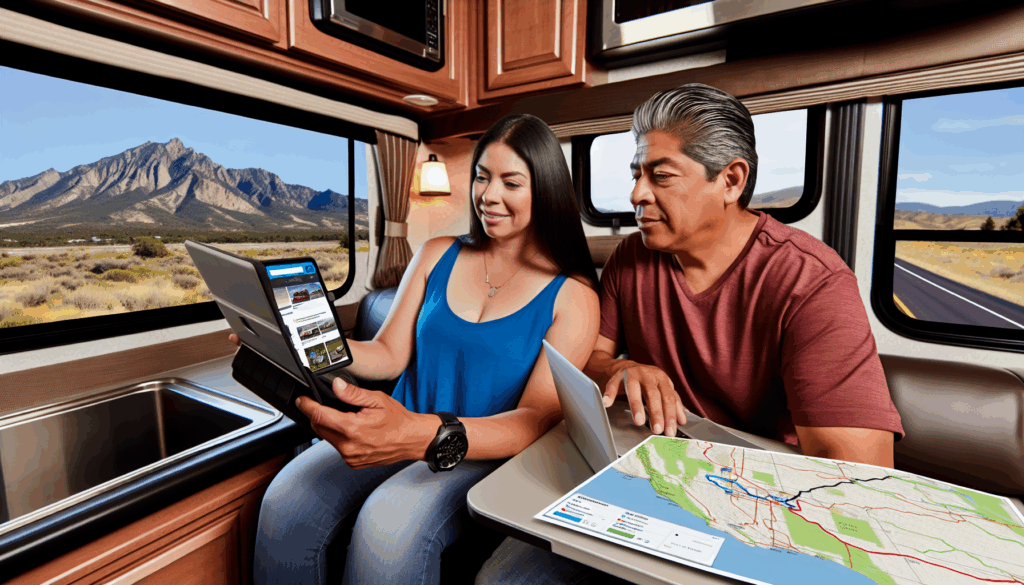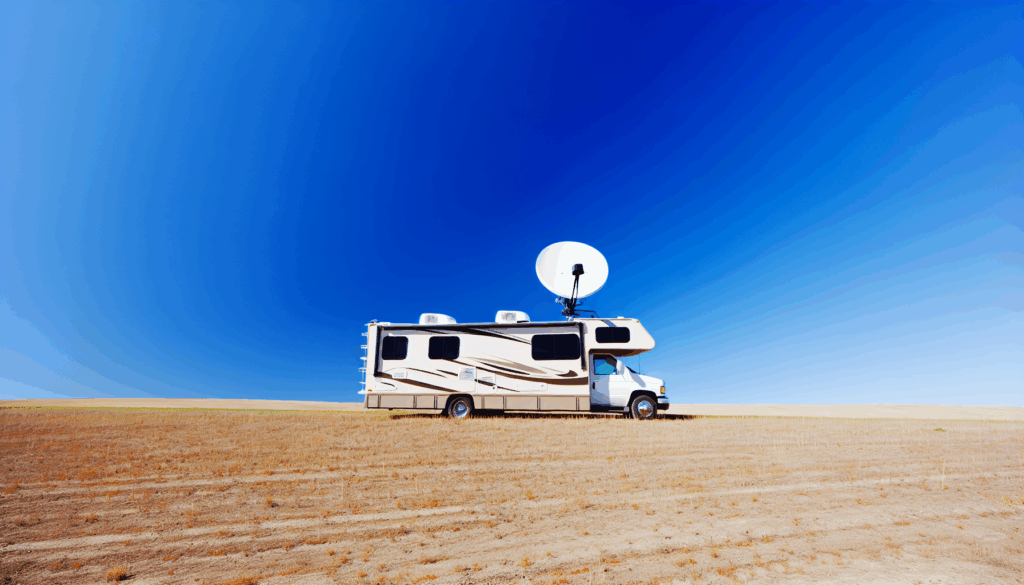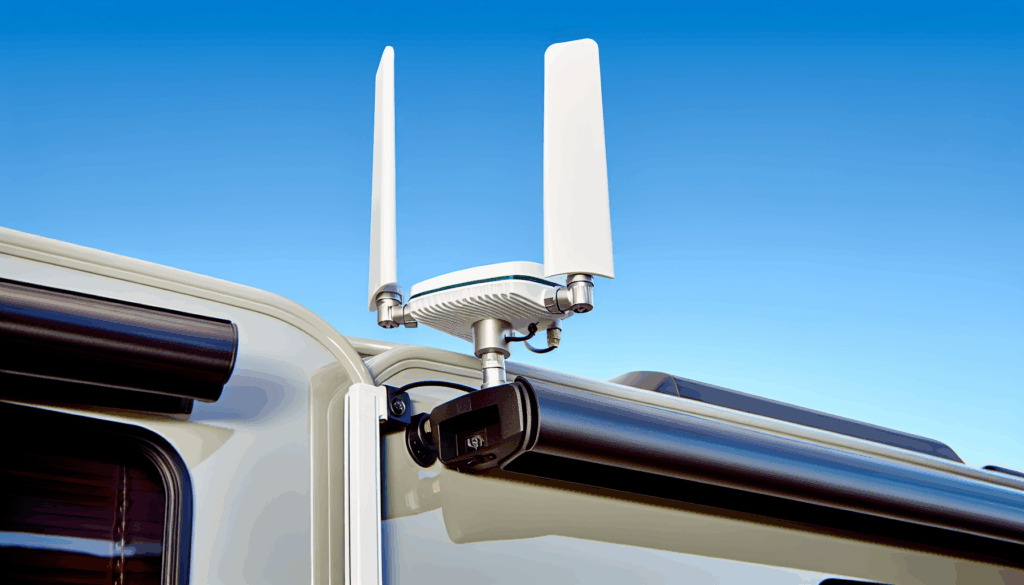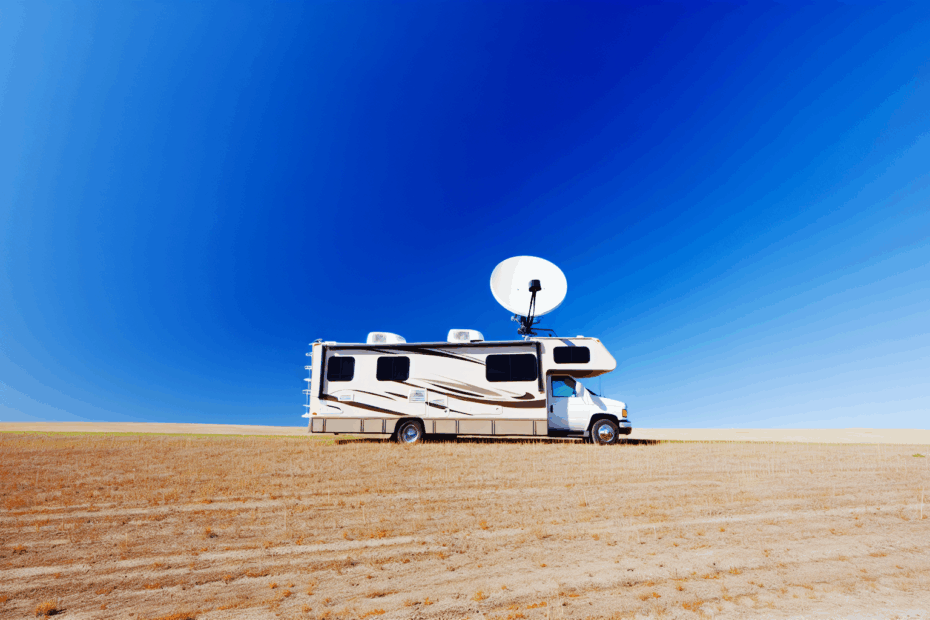In today’s digital age, staying connected while traveling in an RV is more essential than ever. Whether you’re on a short road trip or living full-time on the road, having reliable internet access can make all the difference. From mapping out the next leg of your journey to staying in touch with family and friends, the internet is a vital part of modern RV travel. Let’s delve deeper into everything you need to know about RV parks with excellent internet access and speifically, Exploring RV Parks with Great Internet Access.
What Makes Internet Fast in RV Parks?
A professional photo of a modern RV park with strategically placed routers and people using laptops and tablets comfortably
When you’re on the hunt for an RV park with killer internet, there are a few things to keep in mind. Not all parks are created equal when it comes to Wi-Fi speed. The secret sauce to fast internet for RV travelers in 2025 often includes a neat combo of good infrastructure, fewer users per network, and strong Wi-Fi signals.
Many top-rated RV campgrounds with Wi-Fi use strategically placed routers throughout the park, limiting the number of users each network segment serves at any one time. This means even when the park is full, you can enjoy smooth video streams, seamless video calls, and error-free uploads. Some parks have even upgraded to fiber-optic internet connections to provide blazing-fast speeds.
For the best possible experience, look for RV parks that advertise high-speed connectivity specifically for full-time RV living. These parks ensure minimal downtime and better reliability, which is crucial when working remotely or when binge-watching your favorite series on the go.
How to Plan Adventures with Great RV Internet

A professional photo of a couple inside an RV planning their route using a laptop and tablet, showcasing a digital map and online reviews
Planning an RV trip requires a fair bit of preparation, especially if maintaining internet access is a priority. You can start by researching RV parks with reliable Wi-Fi for remote work or casual browsing. Use apps such as RV Parky, Campendium, and AllStays, which provide user-generated reviews and detailed information about Wi-Fi quality at various campsites.
When selecting your next destination, check out parks that have reviews highlighting excellent Wi-Fi coverage. Planning with tools that show top-rated RV campgrounds with Wi-Fi can save you headaches later on. Each RVer’s internet needs vary greatly based on their travel style, data requirements, and budget.
To enhance your connection experience, it’s wise to set up campsite reservations in advance, especially during peak season. This can ensure that you are allocated a parking spot close to the Wi-Fi source, which is often stronger nearer the campground’s office or main facilities.
How Do WiFi Boosters Work in Campgrounds?

A professional photo of a Wi-Fi booster device installed on an RV, with visible antennas extending to capture signals
Ever heard of Wi-Fi boosters? These little gadgets can be lifesavers when the existing park Wi-Fi just doesn’t hit the mark. They’re designed to amplify existing Wi-Fi signals, making internet access feasible even in the farthest corners of the park.
A Wi-Fi booster picks up the original signal, strengthens it, and then rebroadcasts it inside your RV. This device comes in handy, especially in large parks where the distance from the router to the campsite could diminish signal strength.
For those frequently facing connectivity issues, investing in a quality Wi-Fi booster, like the Bearifi BearExtender, can dramatically improve your online experience. These boosters often feature antennas that can be adjusted to maximize signal reception. They are simple to install and, once set, can consistently provide a solid connection.
For people who rely heavily on a stable connection for work or personal reasons, a booster is a valuable addition to your travel tech arsenal.
Cool Ways to Get Internet on the Road

Life on the road demands flexibility, especially when it comes to staying online. Here are some cool ways to maintain your internet connection while on the move:
- Mobile Hotspots: Devices such as the T-Mobile Inseego 5G MiFi X PRO provide internet access by connecting to cellular networks and broadcasting a Wi-Fi signal within your RV. This ensures connectivity wherever there’s cell service.
- Public Wi-Fi: Many RV-friendly locations like cafes, truck stops, libraries, and rest areas offer free internet. Keep in mind, public Wi-Fi is often free but typically slow and limited in availability.
- Portable Satellite Internet: Services like Starlink offers high-speed connectivity almost anywhere, changing the game for mobile internet. Starlink has around 5,000 functional satellites orbiting overhead, offering extensive coverage.
- Wi-Fi Hotspot from your Phone: Most smartphones have a hotspot feature that allows you to share your phone’s data plan with other devices. This is handy for spontaneous connections without the need for additional hardware.
It’s crucial to find a method that suits your travel style and data needs. Frequent travelers might find it worth the investment to have multiple options available, ensuring that at least one will work at any given stop.
Choosing the Best RV Internet Spot

The location where you park your RV can greatly influence your internet experience. Always aim for open spaces with a direct line of sight to the sky to maximize signal strength. Locations obstructed by dense trees, buildings, or hills can weaken the Wi-Fi signal, leading to frustratingly slow connections.
For the best places to park your RV and stay connected, search for campgrounds known for excellent service networks or those situated near significant towns. Proximity to urban areas typically guarantees better access to cellular towers and public Wi-Fi networks.
Additionally, check online for user comments on forums and travel blogs about which campgrounds offer reliable internet and where the best access points are at these locations. This kind of homework can make a significant difference in your travel experience.
Best Gadgets for Internet on Wheel
Having the right gadgets can turn your RV into a mobile command center with top-notch internet capabilities. Essential devices include:
- Wi-Fi Extenders: Devices like the Bearifi BearExtender help connect to distant Wi-Fi networks, providing broader and more consistent coverage.
- Mobile Routers: Units with SIM slots that can be fitted with data-enabled cards offer stable and fast Wi-Fi access. They are ideal for connecting multiple devices simultaneously.
- Signal Boosters: In remote locations, a cellular signal booster can enhance weak signals, ensuring steady access to the web.
- Antenna Equipment: Many boosters and routers offer external antenna ports to attach high-gain antennas. This improves signal reception even when you’re positioned far from the source.
Investing in these technologies can significantly enhance your travel experience, making internet connectivity less of a hassle and more of a convenience.
Smart Tips for RV Internet
To make the most of your internet access on the go, keep these tips in mind:
- Optimize Usage: Use data-saving settings on streaming apps and download content when you have a robust connection to save on data costs and prevent interruptions.
- Plan for Redundancy: Always have a backup option, such as a different mobile carrier’s plan, to ensure connectivity if your primary option fails.
- Monitor Data Usage: The average RVer uses 50 to 150 GB of data monthly, so apps that track data usage help you stay within your limits and avoid unexpected costs or throttling. Many data plans offer usage alerts to keep you informed.
- Explore Tools: Utilize apps like OpenSignal to find cellular network coverage areas before arriving at your destination.
- Security First: Always use a VPN on public Wi-Fi networks to protect your personal data from potential threats online.
What RVers Say About Internet on the Move
The RV community is a treasure trove of shared wisdom and experiences when it comes to internet connectivity. Many RVers stress the importance of staying connected for work, personal communication, or entertainment while on the road.
Starlink covers over 99% of the U.S. and surrounding maritime areas, offering extensive coverage which is a point often praised by RVers in online forums.
The average cost of RV internet is around $80/mo, a consideration that many RVers discuss when budgeting for their travels.
Online forums and social media groups dedicated to RV travel offer invaluable advice on the latest gadgets, trusted parks with reliable Wi-Fi, and tips for optimizing internet use while journeying across the country. These platforms are excellent resources for both new and veteran travelers, showcasing reviews and personal insights that can greatly aid in planning efficient and connected adventures.
In conclusion, with a combination of the right gadgets, strategic planning, and perhaps a little community wisdom, exploring RV parks with awesome internet access becomes an entirely manageable task. Whether you’re a weekend explorer or a full-time road warrior, staying connected can enrich your journey, making it hassle-free and more enjoyable. Here’s to smooth travels and strong signals!
Exploring RV Parks with Great Internet Access – Wrap Up
lsfka[‘k
Exploring RV Parks with Great Internet Access FAQs
- nxcvbn
- zfbhdfghd
- sfghsg
- sdfghsfgh
